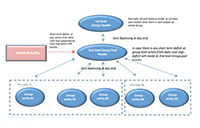Managing Cash by Managing the Supply Chain: Part 2
Stanley Tan, who heads the Working Capital Advisory Team at DBS Bank Global Transaction Services (GTS) shares his view. In the concluding part of this series, he shares how e-commerce, strategy and data can provide companies with a competitive advantage.

Since the Global Financial Crisis of 2008-09, there has been a renewed emphasis on the quality and sustainability of earnings. Beyond top-line revenue growth, management and investors alike have focused on the quality of free cash flows and internal efficiencies as a source of competitive advantage and value creation. In particular, working capital management and the ability to optimise cash conversion cycle (CCC) times have become increasingly important.
E-commerce and the acceleration of cash conversion times
The impact of electronic commerce (e-commerce) also shows up in cash conversion cycle (CCC) times. For example, Amazon has a CCC time of negative 27 days, driven by its superior Days Inventory Outstanding (DIO) - 45 days versus US retailers’ top quartile of 59 days - and Days Payables Outstanding (DPO) - 94 days versus US retailers’ top quartile of 52 days. As e-tailing continues to disrupt established business models, retailers will need to configure their supply chains accordingly.
Within Asia, e-commerce is booming. In 2013, China broke the record for the largest one-day online sale with its Singles Day (11 November or 11/11) sales of at least U$5.8bn. This surpassed by two and a half times the total for American retailers on ‘Cyber Monday’, which in the US since 2005 has been established as the Monday after Thanksgiving. According to Forrester Research, Chinese consumers spent an estimated US$290bn at online retail sites in 2013, exceeding the US$260bn spent by US consumers.
E-commerce is poised to drive CCC times in Asia even lower. Retailers can use a shortened CCC time to free up working capital and use this excess cash to invest in logistics networks and strategic distribution relationships.
CFO and Treasurer as Strategist
A more active role is needed today, not only to identify and free up incremental cash, but to help shape supply chain policies to manage disruptive threats or build a distinct value proposition. This shift from the ‘gate-keeper’ role to a strategic role is not easy.
Often, CFOs/treasurers of larger corporates can find themselves with narrower, siloed views and have limited involvement in the end-to-end supply chain matters. For CFOs/treasurers of small and medium-sized enterprises (SMEs), the challenge often takes the form of limited resources and data. Manpower/resources are spent ensuring the smooth financial flow of the company. As such, there are limited resources to extract the appropriate data; much less to perform the appropriate data analytics to generate insights.
Leveraging data
Thankfully, the emergence of data-driven analytic tools and insights can help CFOs/treasurers identify opportunities to free up incremental cash and better manage their CCC. For example, they can compare their CCC times (and underlying drivers) against industry benchmarks and against specific peers. Doing so not only identifies opportunity areas, it acts as an ‘early warning system’ to highlight competitive advantages that others may have started to build in their own supply chains.
For multinational corporations (MNCs) or conglomerates, working capital benchmarking also allows for geographic subsidiaries or business units to be better managed - for example, comparing an Asian subsidiary’s working capital performance against specific Asian companies to provide a more appropriate target.
Conclusion
There is a competitive advantage from optimising cash flow and working capital management. CFOs and treasurers are uniquely placed to manage cash and working capital efficiently by helping to manage the supply chain trade-offs. They are the natural guardians of large amounts of data and can leverage this to build holistic insights across the business. Through active management of the CCC and its underlying drivers, they can look for cash trapped in sub-optimal working capital practices, increase free cash-flow and drive value creation.
*All CCC data from Capital IQ; includes companies classified under 'retailing' industry, with revenues US$50m and above, and primarily located in Asia Pacific, Europe or US/Canada
Subscribe to DBS BusinessClass
Stay updated with the latest market trends and industry insights, connect with a network of entrepreneurs, and gain access to exclusive event invitations. Join Asia's fastest growing business community – get your complimentary membership here.




